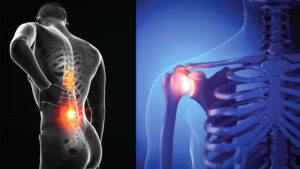 Work-Related Musculoskeletal Disorders (WMSDs) are caused by using high force, repetitive movements, awkward postures, or too much vibration on the job.
Work-Related Musculoskeletal Disorders (WMSDs) are caused by using high force, repetitive movements, awkward postures, or too much vibration on the job.
WMSDs can be painful, debilitating, and lead to lost work time. In Washington, 40% of compensable workers’ compensation claims are for WMSDs. These claims were most commonly caused by overexertion when lifting (33%), pulling or pushing objects (7%), and holding, carrying, turning, or wielding objects (7%.)
The most frequently injured part of the body is the lower back, accounting for 28% of all claims. Shoulder injuries rank a distant second at 17%.
WMSD claims in Retail Trade are costly in Washington state. These claims have an average cost of over $10,000 per claim and have resulted in an average of 50 days of time loss per claim.
Overexertion prevention safety practices:
Proper posture, body mechanics, and ergonomics can lessen overexertion injuries. Management and supervisors should consider adopting these safety practices:
- Employees should stretch and warm up before heavy lifting or strenuous activity
- Carts, hand trucks, or dollies should be available for workers to use when handling heavy objects
- Lifting should be with a sure grip, with legs bent, and objects held close to the body
- Feet should point in the same direction as the lift, and twisting while lifting should be avoided
- Bending, overreaching, and twisting when lifting should be avoided
- For items that may be awkward to carry, a “buddy” should be required to share the load
- Evaluate job processes regularly to identify safer ways to perform tasks
- Avoid heavy manual material handling when possible—for example, store items off the floor. The heaviest items to be lifted should be stored at a mid-thigh to mid-chest height.
- Encourage workers to report any tasks that cause pain or discomfort right away.
- Have an ergonomist or safety and health specialist evaluate demanding tasks. L&I offers free consultations.
- The demands of the job should always match the capabilities of the worker. Evaluation and extra training are essential to ensure that every worker is equipped to perform every task safely.
For additional information:
RS SafetyTV has several videos on lifting and back safety
RS Safety Library – Ergonomics section – Reducing Awkward Postures
SAFEME – Material Handling module
Proper Lifting module
Rick Means, Director of Safety and Education, is available to help members with safety. Contact Rick at 360-943-9198, Ext. 118 or [email protected].





